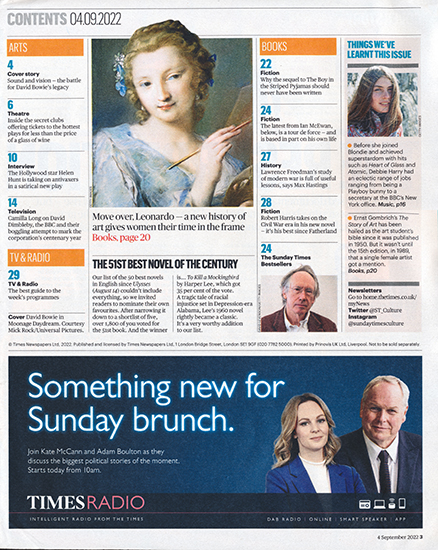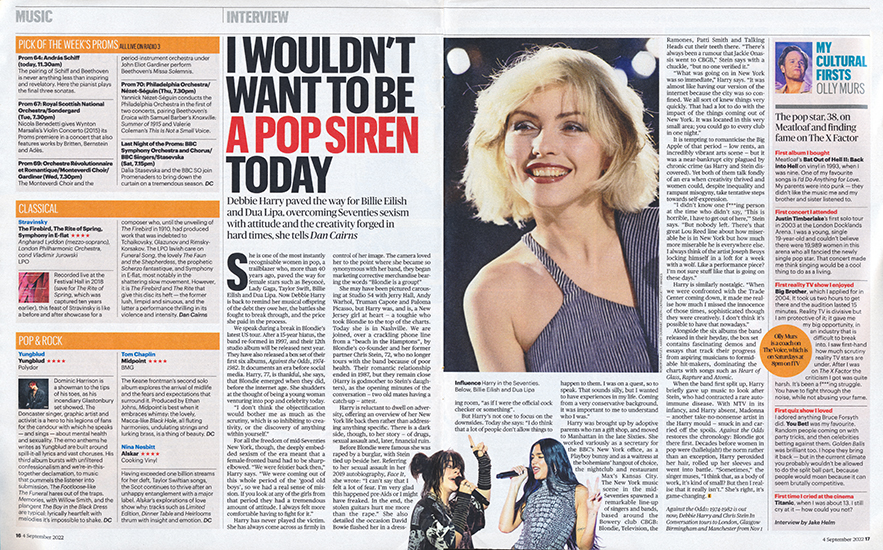THE SUNDAY TIMES – CULTURE
Page 3
Contents
THINGS WE’VE LEARNT THIS ISSUE
Before she joined Blondie and achieved superstardom with hits such as Heart of Glass and Atomic, Debbie Harry had an eclectic range of jobs ranging from being a Playboy bunny to a secretary at the BBC’s New York office. Music, p16
Pages 16 & 17
Interview
I WOULDN’T WANT TO BE A POP SIREN TODAY
Debbie Harry paved the way for Billie Eilish and Due Lipa, overcoming Seventies sexism with attitude and the creativity forged in hard times, she tells Dan Cairns
She is one of the most instantly recognisable women in pop, a trailblazer who, more than 40 years ago, paved the way for female stars such as Beyoncé, Lady Gaga, Taylor Swift, Billie Eilish and Dua Lipa. Now Debbie Harry is back to remind her musical offspring of the debt they owe her, the battles she fought to break through, and the price she paid in the process.
We speak during a break in Blondie’s latest US tour. After a 15-year hiatus, the band re-formed in 1997, and their 12th studio album will be released next year. They have also released a box set of their first six albums, Against the Odds, 1974-1982. It documents an era before social media. Harry, 77, is thankful, she says, that Blondie emerged when they did, before the internet age. She shudders at the thought of being a young woman venturing into pop and celebrity today.
“I don’t think the objectification would bother me as much as the scrutiny, which is so inhibiting to creativity, or the discovery of anything within yourself.”
For all the freedom of mid-Seventies New York, though, the deeply embedded sexism of the era meant that a female-fronted band had to be sharp-elbowed. “We were feistier back then,” Harry says. “We were coming out of this whole period of the ‘good old boys’, so we had a real sense of mission. If you look at any of the girls from that period they had a tremendous amount of attitude. I always felt more comfortable having to fight for it.”
Harry has never played the victim. She has always come across as firmly in control of her image. The camera loved her to the point where she became so synonymous with her band, they began marketing corrective merchandise bearing the words “Blondie is a group!”
She may have been pictured carousing at Studio 54 with Jerry Hall, Andy Warhol, Truman Capote and Paloma Picasso, but Harry was, and is, a New Jersey girl at heart – a toughie who took Blondie to the top of the charts. Today she is in Nashville. We are joined, over a crackling phone line from a “beach in the Hamptons”, by Blondie’s co-founder and her former partner Chris Stein, 72, who no longer tours with the band because of poor health. Their romantic relationship ended in 1987, but they remain close (Harry is godmother to Stein’s daughters), as the opening minutes of the conversation – two old mates having a catch-up – attest.
Harry is reluctant to dwell on adversity, offering an overview of her New York life back then rather than addressing anything specific. There is a dark side, though, to her story – of drugs, sexual assault and, financial ruin.
Before Blondie were famous she was raped by a burglar, with Stein tied up beside her. Referring to her sexual assault in her 2019 autobiography, Face It, she wrote: “I can’t say that I felt a lot of fear. I’m very glad this happened pre-Aids or I might have freaked. In the end, the stolen guitars hurt me more than the rape.” She also detailed the occasion David Bowie flashed her in a dressing room, “as if I were the official cock checker or something.”
But Harry’s not one to focus on the downsides. Today she says: “I do think that a lot of people don’t allow things to happen to them. I was on a quest, so to speak. That sounds silly, but I wanted to have experiences in my life. Coming from a very conservative background, it was important to me to understand who I was.”
Harry was brought up by adoptive parents who ran a gift shop, and moved to Manhattan in the late Sixties. She worked variously as a secretary for the BBC’s New York office, as a Playboy bunny and as waitress at the bohemians’ hangout of choice, the nightclub and restaurant Max’s Kansas City. The New York music scene in the mid-Seventies spawned a remarkable line-up of singers and bands, based around the Bowery club CBGB: Blondie, Television, the Ramones, Patti Smith and Talking Heads cut their teeth there. “There’s always been a rumour that Jackie Onassis went to CBGB,” Stein says with a chuckle, “but no one verified it.”
“What was going on in New York was so immediate,” Harry says. “It was almost like having our version of the internet because the city was so confined. We all sort of knew things very quickly. That had a lot to do with the impact of the things coming out of New York. It was located in this very small area; you could go to every club in one night.”
It is tempting to romanticise the Big Apple of that period – low rents, an incredible vibrant arts scene – but it was a near-bankrupt city plagued by chronic crime (as Harry and Stein discovered). Yet both of them talk fondly of an era when creativity thrived and women could, despite inequality and rampant misogyny, take tentative steps towards self-expression.
“I didn’t know one f***ing person at the time who didn’t say, ‘This is horrible, I have to get out of here,'” Stein says. “But nobody left. There’s that great Lou Reed line about how miserable he is in New York but how much more miserable he is everywhere else. I always think of the artist Joseph Beuys locking himself in a loft for a week with a wolf. Like a performance piece? I’m not sure stuff like that is going on these days.”
Harry is similarly nostalgic. “When we were confronted with the Trade Center coming down, it made me realise how much I missed the innocence of those times, sophisticated though they were creatively. I don’t think it’s possible to have that nowadays.”
Alongside the six albums the band released in their heyday, the box set contains fascinating demos and essays that track their progress from aspiring musicians to formidable hit-makers, dominating the charts with songs such as Heart of Glass, Rapture and Atomic.
When the band first split up, Harry briefly gave up music to look after Stein, who had contracted a rare auto-immune disease. With MTV in its infancy, and Harry absent, Madonna – another take-no-nonsense artist in the Harry mould – snuck in and carried off the spoils. Against the Odds restores the chronology: Blondie got there first. Decades before women in pop were (hallelujah!) the norm rather than an exception, Harry peroxided her hair, rolled up her sleeves and went into battle. “Sometimes,” the singer muses, “I think that, as a body of work, it’s kind of small? But then I realise that it really isn’t.” She’s right, it’s game-changing.
Against the Odds: 1974-1982 is out now; Debbie Harry and Chris Stein In Conversation tours to London, Glasgow, Birmingham and Manchester from Nov 1






